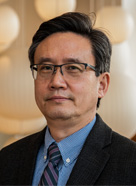
Conference Program
HOME > Conference Program > Award Lecture
Ilchun Memorial Lecture
September 14 (Thu), 15:50-16:20, Rm. 401

Improving Clinical Practice through Integrated translational Research:
Transforming the Lives of Future Patients with Rare Disorders
- Sihoun Hahn, M.D., Ph.D.
- Department of Pediatrics and Medicine,
University of Washington School of Medicine, Seattle Children's Hospital, Seattle, USA
Department of Genome Medicine and Science, Gachon University School of Medicine, Korea
Sihoun Hahn, MD, PhD is currently a Professor of Pediatrics and Adjunct Professor of Medicine at the University of Washington and Seattle Children's Hospital and a Medical Director of Biochemical Genetics Program in Seattle, WA, U.S.A. He was a Consultant and Associate Professor at Mayo Clinic School of Medicine in Minnesota, U.S.A. before joining the University of Washington in 2006. Since 2015, he has been serving as a Founding Chair of the Department of Genome Medicine and Science, Gachon University School of Medicine in Incheon, Korea as a visiting professor and as a Director of Gachon Institute of Genome Medicine and Science. Dr. Hahn graduated from Korea University College of Medicine in 1983 and received his Ph.D. degree from the Korea University Graduate School in 1995. He was trained at Korea University Medical Center and is board certified in Korean Pediatrics. He was further trained at National Institute of Health in the U.S. under National Research Service Award Fellowship and completed the ACGME accredited Medical Genetics training in 1994. He is board certified in American Board of Clinical Genetics and American Board of Clinical Biochemical Genetics. Dr. Hahn's research has focused on inborn errors of metabolism to understand the genetic background and biochemical/molecular pathophysiology in particular copper transport defects. Previously, he and his colleagues identified the mutational spectrum of ATP7B gene in Korean patients with Wilson disease and characterized the transcription regulation of ATP7B gene. His recent work focuses on early detection by developing a newborn screening method using tandem mass spectrometry, specifically for Wilson's disease, a genetic disease in which the body cannot properly excrete copper leading to accumulation in various organs, including the liver and brain. He is a Director of Center of Excellence for Wilson Disease at Seattle Children's Hospital and serves as a Member of Medical Advisory Committee for Wilson Disease Association in the U.S. He published more than 112 peer-reviewed reviews and invited book chapters. He has been actively involved as a leader in many public and private scientific and academic sectors. He currently serves as a Section Editor for Genetics in UpToDate, Inc., and Advisory Committee for WA State Newborn Screening. He is a recipient of National Research Service Award (1990), Travel Award (Young Investigator) from International Congress of Inborn Errors of Metabolism (1994), Member of Society for Pediatric Research (2003), and American College of Medical Genetics/Luminex Award (2009). He Is a PI for NIH-granted research projects (R01, etc.), private- and industry-sponsored projects.
Dr. Hahn hopes to improve clinical practice through integrated laboratory and true translational research. He remains a great believer in prevention; identifying the illness before the symptoms appear and providing interventions for patients are always preferable to treating the developed disease.





